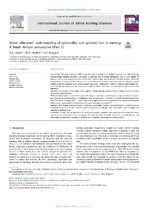| dc.contributor.author | Phetlhu, Deliwe Rene | |
| dc.contributor.author | Klopper, H.C. | |
| dc.contributor.author | Linda, N.S. | |
| dc.date.accessioned | 2021-09-15T09:08:11Z | |
| dc.date.available | 2021-09-15T09:08:11Z | |
| dc.date.issued | 2020 | |
| dc.identifier.citation | Linda, N.S. et al. (2020) Nurse educators’ understanding of spirituality and spiritual care in nursing: A South African perspective (Part 1). International Journal of Africa Nursing Sciences, 12: 100187. Doi: http://dx.doi.org/10.1016/j.ijans.2019.100187 | en_US |
| dc.identifier.uri | http://dx.doi.org/10.1016/j.ijans.2019.100187 | |
| dc.identifier.uri | http://hdl.handle.net/10566/6677 | |
| dc.description.abstract | Introduction: The nurse educators’ (NE's) expressed lack of confidence to facilitate spiritual care when teaching undergraduate nursing correlates conversely to reported lack of formal integration due to slow uptake of spiritual care in most nursing schools in South Africa. In this study, “spiritual care” relates to holistic care which is designed to reach the invisible, deep human needs that are important to meet personhood needs such as good health, search for meaning, hope, inner strength and peace. “Spirituality” refers to ‘inherent-inborn-inner motives that give meaning and hope in one's life; and the essence that gives meaning and purpose to one's very existence. Objective: The purpose of the study was to explore and describe the understanding of spiritual care in nursing practice by nurse educators. Methods and procedures: A qualitative approach using an exploratory and descriptive design was used to explore and describe the understanding of “spirituality” and “spiritual care” by the NEs. In-depth structured interviews were conducted. A sample of (n = 10) NEs who were purposively selected responded to the open-ended question “what is your understanding of spiritual care in nursing education and practice”? Findings: Three themes emerged include: (i) defining “spirituality” within a nursing context; (ii) spiritual care as a missing component in the curriculum and (iii) perceived challenges and constraints in the teaching and learning of spiritual care. Conclusion: Despite lack of spiritual care guidelines posing a problem, NEs unequivocally exemplified their willingness to teach students how to engage with patients’ spiritual needs. A need for a guiding theory and philosophy to formalised teaching of spiritual care in nursing education was acknowledged. | en_US |
| dc.language.iso | en | en_US |
| dc.publisher | Elsevier | en_US |
| dc.subject | Nursing curriculum | en_US |
| dc.subject | Spirituality | en_US |
| dc.subject | Qualitative approach | en_US |
| dc.subject | Spiritual Care | en_US |
| dc.subject | Teaching and learning | en_US |
| dc.subject | Nursing education | en_US |
| dc.subject | Higher education | en_US |
| dc.subject | Tertiary education | en_US |
| dc.subject | Structured interview | en_US |
| dc.subject | Education | en_US |
| dc.subject | Exploratory research | en_US |
| dc.subject | Holistic care | en_US |
| dc.title | Nurse educators’ understanding of spirituality and spiritual care in nursing: A South African perspective (Part 1) | en_US |
| dc.type | Article | en_US |

